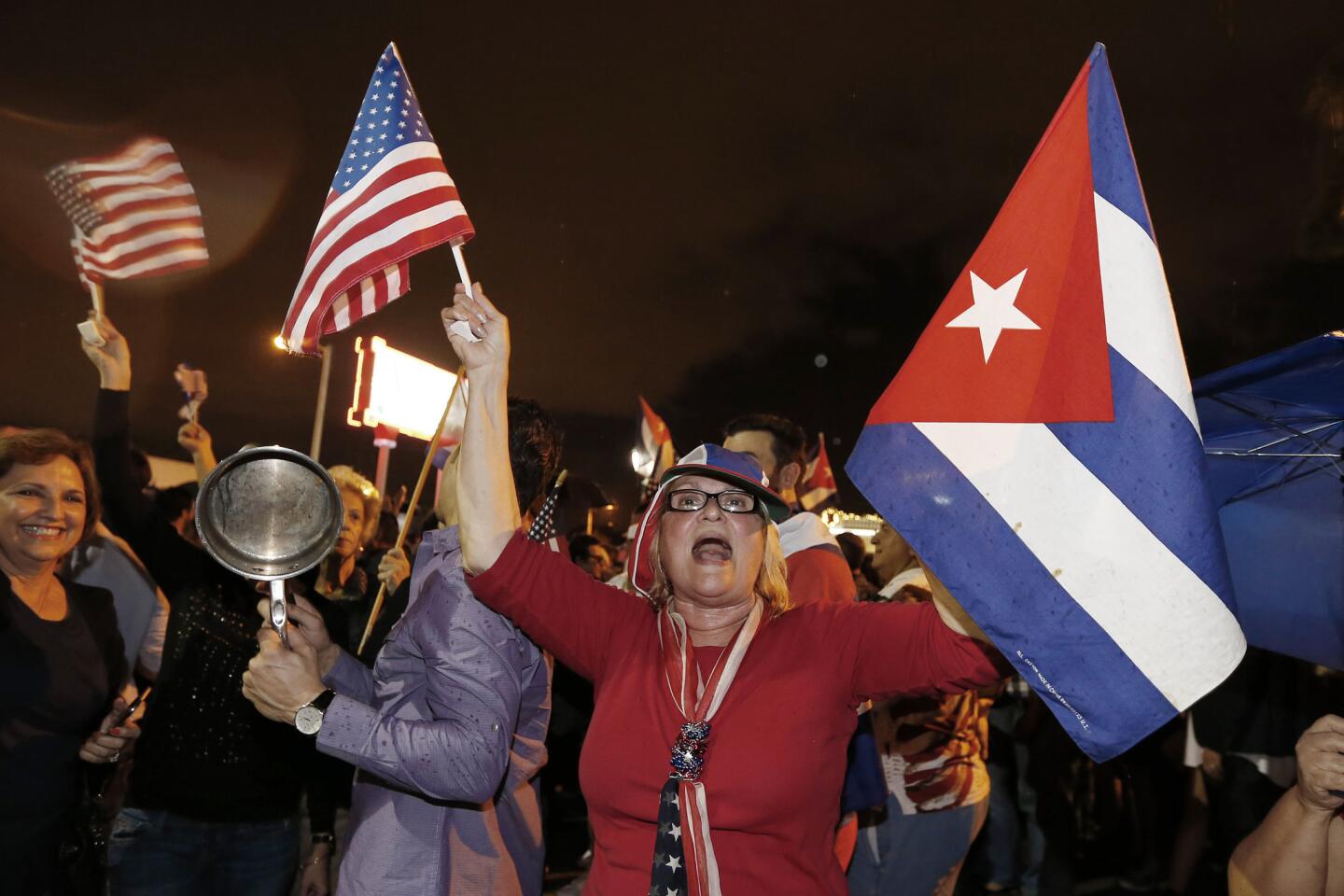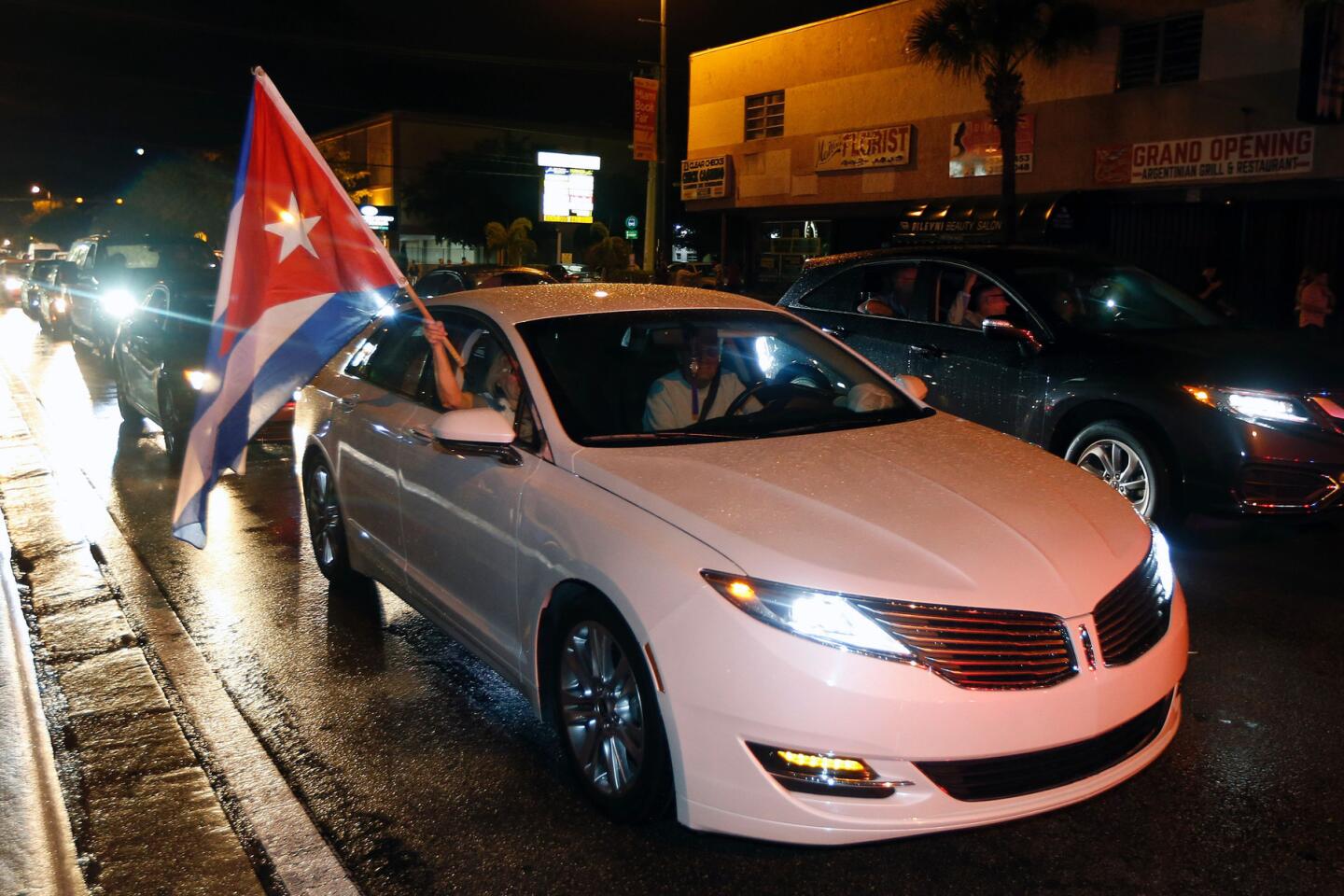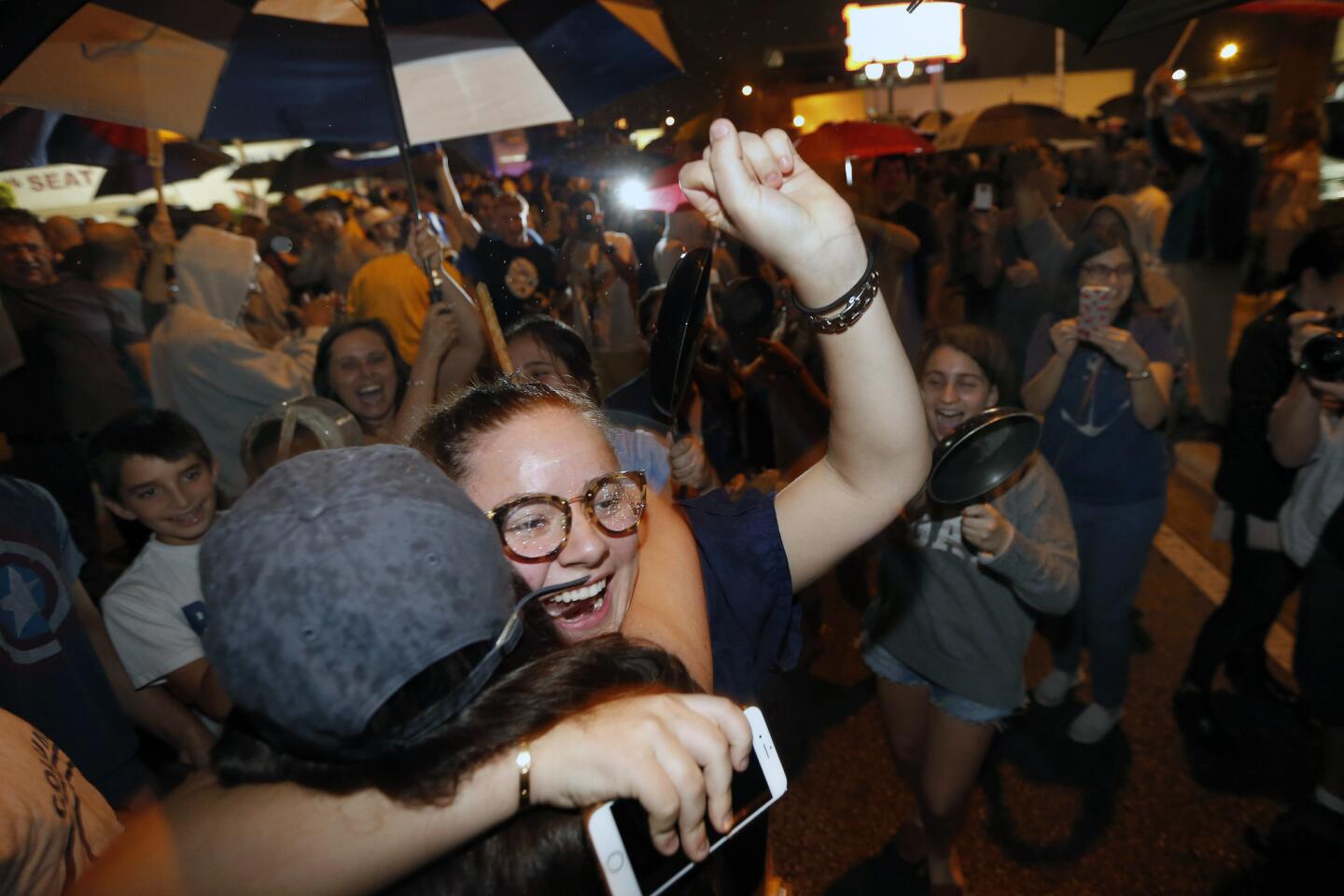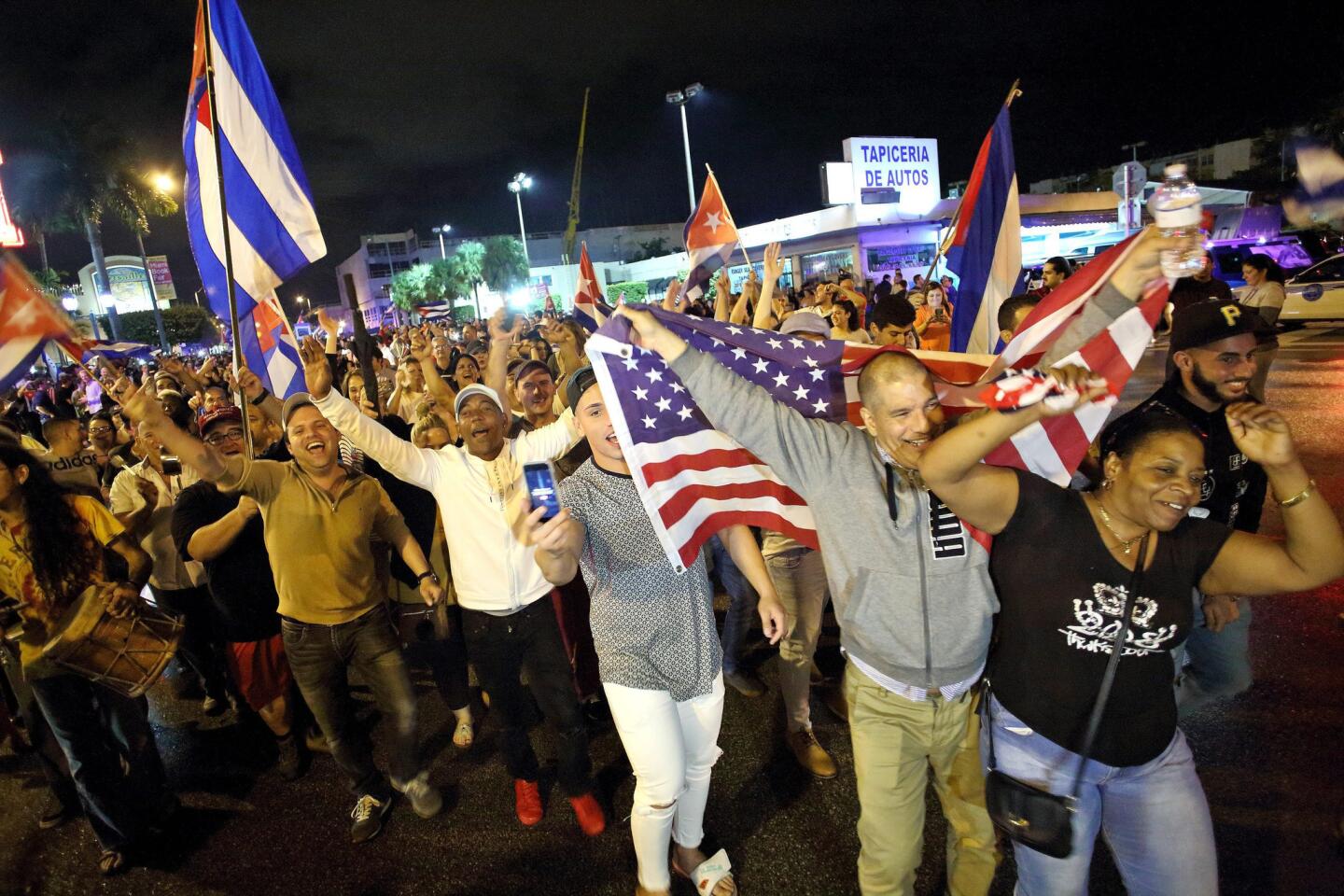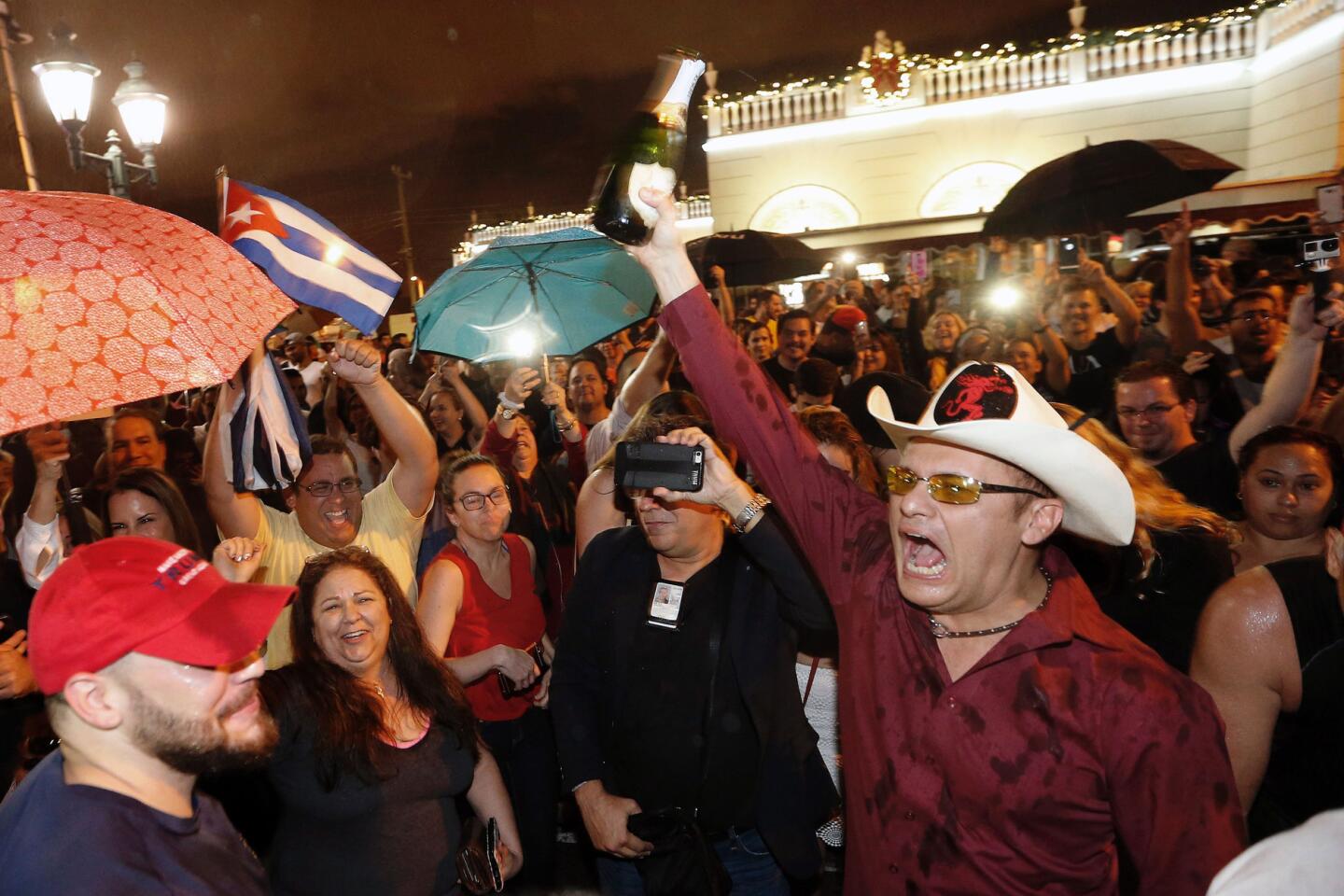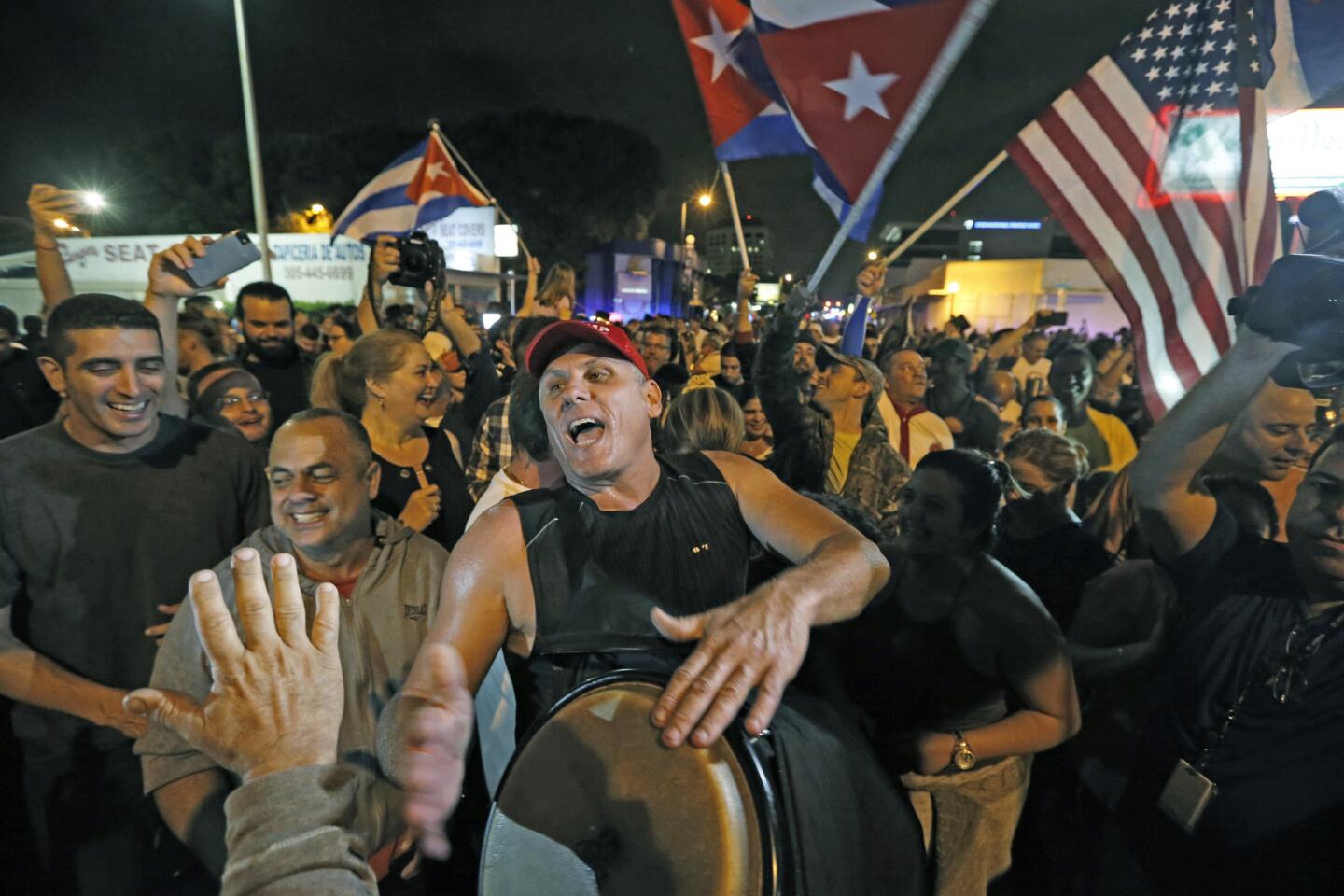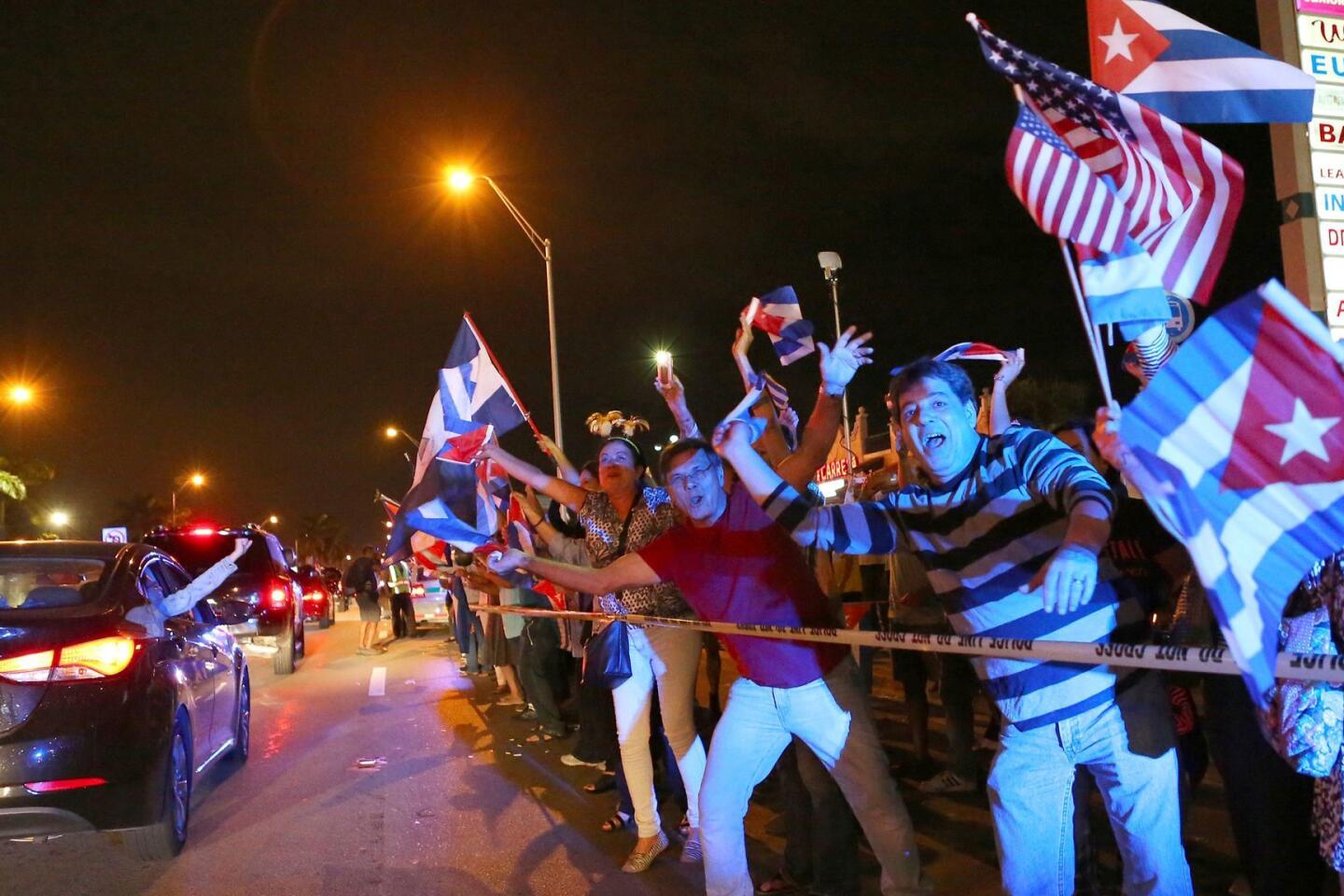In Miami’s Little Havana, Cubans whoop, dance and reflect as they celebrate Castro’s death

Couples twirled and shimmied their hips to blasting salsa and rumba music. Men smoked thick Cuban cigars. Women and girls paraded in flouncy Sunday dresses.
- Share via
Reporting from Miami — Early Saturday morning, Salma Bustamante woke up her father, Nemesio, with just a few words: “Papi, he died.”
Nemesio, 89, a former journalist, understood she meant Fidel Castro, the former president of his Cuban homeland.
Within a few hours, the frail exile was sitting in a wheelchair in the middle of Little Havana, eyes misting as thousands of his fellow countrymen took to the streets to dance, whoop and bang wooden spoons on metal pots and pans.
Dressed in a sharply pressed blue, button-down shirt and a short-brim straw fedora, he cradled a framed black-and-white photograph of the Bustamante family — including Salma, at age 4, arriving at Miami airport in 1963.
“He’s delighted, and I’m so happy he could witness this day,” said Salma, now an English language professor at Miami Dade College.
“My parents never taught me to wish death on anyone; however, my heart is filled with the joy this represents for my father,” she said as fellow exiles sidled over to take selfies with her father and ask about his history. “This represents my parents’ sacrifice. He made a new life for us, but all his family died in Cuba.”
If only, she added, her mother, who died last year, could have lived to see Little Havana today.
Police blocked off 8th Street, or “Calle Ocho,” as a stream of Cuban exiles walked down the middle of the neighborhood’s usually car-clogged main thoroughfare waving the Cuban national flag and screaming, “Libertad!” and “Cuba libre!”
Couples twirled and shimmied their hips to blasting salsa and rumba music. Men smoked thick Cuban cigars. Women and girls paraded in flouncy Sunday dresses.
Outside Versailles bakery, a landmark Cuban American cafe, families devoured sweet espressos and sticky pastelitos.
Around them, a procession of sedans, SUVs and pickups circled the nearby streets of squat stucco homes and tall palm trees, honking horns. On almost every corner, vendors set up makeshift stores, hawking Cuban flags for five dollars.
There is little love for Castro in this neighborhood, a five-minute drive west of downtown Miami. Many here fled Cuba after Castro took power in 1959, leaving almost all their possessions and family behind.
They waited for this moment for decades — as the communist leader continued to rule Cuba, even as he became an ailing old man, then handed power to his brother Raul.
Several people in the crowd carried signs for Alpha 66, an anti-Castro paramilitary group. One man held up a white banner proclaiming: “Rejoice world. Satan’s envoy, Fidel Castro, is dead.” Another wielded a wooden stake topped with a bloody replica of Castro’s head.
The revelry extended beyond Little Havana. Along West 49th Street in Hialeah, an outlying municipality of Miami with a sizable concentration of Cuban exiles, there was more flag waving, car horn honking and crowds.
“It’s the beginning of the end of the dictatorship,” said Pedro Zabala, 54, who served two years in a military unit that was fighting the South African government in Angola and later spent a year in prison, because he was caught trying to flee Cuba on a homemade raft.
“Since there have been so many killings and wrongful imprisonments, it’s sort of like justice is finally being served,” Zabala said. “The only thing I am sad about is that Fidel Castro wasn’t ever tried in a court of law for crimes against humanity.”
The passing of Castro was also welcomed by Miami’s mayor, Tomas Regalado, who was born in Cuba and whose father was a political prisoner for more than 20 years.
“For 57 years Fidel Castro has been the symbol of tyranny and oppression of our people,” Regalado said in a statement. “I call on the Obama administration and the Trump administration to demand real changes from the Cuban regime, on behalf of many Cubans who have died in the U.S. and in Cuba waiting for this day and for freedom.”
Yet not everyone on the streets Saturday reveled in Castro’s death.
Gloria Martinez, 41, an accountant who moved to the U.S. when she was 23, brought her two daughters, Celia and Anna, to Little Havana to witness the moment. She shook her head as she watched the crowd celebrate.
“This is a circus,” she said softly, clutching her arms around her chest. “This is a moment in the history of Cuba and Miami, but I don’t feel happy because he’s dead. He was a leader and a good person.”
Martinez has fond memories of growing up in Cuba under Castro.
“I had a happy childhood,” she said. “He gave me everything. He made me what I am.”
For Julio Sanchez, 50, the revelry wasn’t just about celebrating the death of one man.
“We are celebrating the fall of a dictator,” said Sanchez, as he walked his dog through the thick crowd in Little Havana. “That’s why so many people are here.”
Sanchez said he moved to the U.S. six years ago to avoid going to jail for working with a dissident group. Half of his family remains “stuck” over there, he said.
“Castro kept the people poor and in slavery,” he said. “His alibi was to help poor people. Actually, he took from the poor. His main goal was to keep power.”
Hidalmi Quesada, 55, who came to the U.S. with her parents in 1967, said Castro’s death gave “new hope” to Cubans.
“We want a transition to democracy, to remove the veil that the Castro regime has put over Cuba,” she said. “I think the new American president will make something good from Castro’s death, some opportunity for the Cuban people.”
Many of those out in the streets carried signs in support of President-elect Donald Trump.
“Our hope is in President Trump,” said Dailia Gomez, 55, whose family was forced from their home by the Cuban government in the 1980s and later moved to the U.S. after passing through Italy and Venezuela. “I believe he can regain our liberty in Cuba.”
As dusk fell, the music pumped louder, and dance parties erupted on almost every corner of Calle Ocho.
Women in high heels wiggled their hips and posed for selfies as they waved posters for Sunday’s edition of the Miami Herald newspaper emblazoned with the words: “Castro Dead.”
Jarvie and Neuhaus are special correspondents.
MORE ON FIDEL CASTRO
Obama’s Cuba visit to augur a ‘new beginning’ between nations
Former president Fidel Castro appears in public in Cuba
Pope meets Fidel Castro after delivering jab against communist system
UPDATES:
7:55 p.m.: This article was updated with more description and quotes from the streets of Miami.
12:40 p.m.: This article was updated with the scene in Hialeah.
11:50 a.m.: This article was updated with staff reporting.
This article was initially published at 12:40 a.m.
More to Read
Sign up for Essential California
The most important California stories and recommendations in your inbox every morning.
You may occasionally receive promotional content from the Los Angeles Times.
